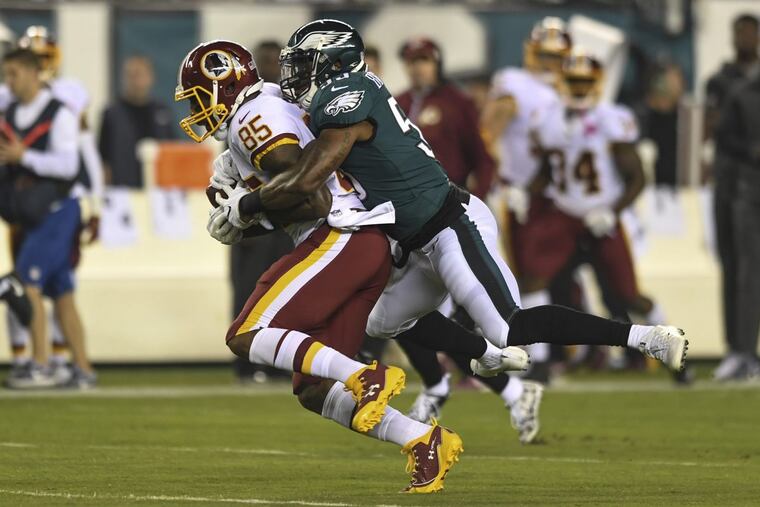No running from the Eagles' defense
The Eagles own the league's No. 1-ranked run defense. They've held opponents to 67.0 rushing yards per game.

The first time the Wide-9 passed through Philadelphia under the arm of crusty old Jim Washburn back in 2011-12, it was panned by critics and viewed as a flawed idea that might be terrific for chasing down quarterbacks on third and long, but wasn't very practical for stopping enemy ball carriers the rest of the time.
The numbers more or less bore that out during those two seasons. In 2011, the Eagles finished tied for the league lead in sacks, but were 16th against the run and gave up 54 runs of 10 yards or more.
A year later, they weren't very good at either, finishing tied for 25th in sacks and 23rd against the run, giving up 63 runs of 10-plus yards, which was the fourth most in the league.
The feeling back then was that you couldn't line up your defensive ends in East Jabip and expect your linebackers and safeties to fill the interstate-wide run lanes the Wide-9 created, even though it had been very successful for Washburn and his former defensive boss, Jim Schwartz, in Tennessee.
The Wide-9 returned to Philly last year when Doug Pederson hired Schwartz to run his defense. And, well, no one is suggesting anymore that you can't play it and stop the run.
Through seven games, the 6-1 Eagles are first in the league against the run, allowing just 67.0 rushing yards per game, and are 11th in rush average (3.8). Just one team has rushed for more than 80 yards against them (Kansas City, 112).
They've allowed the league's third fewest rushing first downs (24) and the third fewest double-digit-yard runs.
Schwartz's run defense has been aided by a potent, quick-starting offense that is fifth in the league in scoring, and has outscored teams in the first quarter, 44-9. The Eagles have trailed going into the fourth quarter just once this season (13-10 against the Chiefs).
As a result, they have been run on less than any team in the league. Opponents have averaged just 17.6 rushing attempts per game against them. Just one team – Carolina in Week 7 – has run the ball more than 19 times against the Eagles (25).
That said, when teams have run the ball, the Eagles usually have stopped them. Seventy-two of 123 rushing attempts against them have gained 2 yards or fewer. Thirty-one of those 71 have been for losses.
"We're a good penetration team up front,'' Schwartz said. "And then we have good tackling linebackers and good tackling safeties that can clean it up.''
Schwartz said some of the coverages his defense plays also have contributed to their success against the run this season.
"We play some hard boxes,'' he said. "Eight-man-front type of stuff. Even if it's a pass defense, there's still enough guys [on the field] that we can defend the run.''
One guy the defense won't have for the rest of the season is middle linebacker Jordan Hicks, who ruptured his right Achilles tendon Monday night in the Eagles' 34-24 win over Washington.
That will put a heavier run-stopping burden on the Eagles' other two starting linebackers, Nigel Bradham and Mychal Kendricks. Both have been playing well, particularly Bradham, who is having a Pro Bowl-calibre year.
"He's got a chip on his shoulder,'' safety Malcolm Jenkins said of Bradham. "That's his entire game. He's going to run to the ball, and when he gets there, he's arriving violently. We needed that.
"He played well last year, but this year he's taken it to another level. With Jordan out, having that steady guy out there is important. And Nigel has really stepped up and taken that role.''
The Eagles have had just two noteworthy run breakdowns in the first seven games. They gave up a 53-yard touchdown run to the Chiefs' Kareem Hunt in Week 2 and a 35-yard TD run to the Chargers' Austin Ekelor in Week 4. So far, that's been it. Last year, they gave up eight run plays of 25 or more yards.
"We trust our front,'' Jenkins said. "We know every fit. Guys trust what they see. The way we stop the run is getting a lot of people to the football, and effort.
"We don't have a magic scheme or anything like that. When our offense can put up points and we can get a two-score lead and pin our ears back, teams abandon the run and it makes us a lot more dangerous.''
The Eagles have been able to pin their ears back a lot. Their opponents have a league-low 28.6 run percentage. No one else is close. Buffalo is second at 37.4.
"We want to make every offense we play one-dimensional,'' Bradham said. "Being able to run the ball is something that's just too easy for an offense. So we want to take that away.''
That shouldn't be difficult Sunday against the 0-7 49ers, who are 23rd in rushing (96.0 yards per game) and have the league's third lowest run-play percentage (34.3). The Niners have been outscored in the first half, 92-41.
"We're not giving anybody any lanes [to run],'' Bradham said. "We've got guys swarming [to the ball]. We call that controlled chaos. We want to be everybody to the ball. First one gets there [for the tackle], second one gets there and tries to rip [the ball] out. That's the mentality of how we practice, and it's showing in the game.''